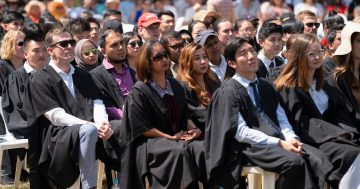
Education Minister Jason Clare plans to cap international student enrolments in Australian unis and VET colleges to 270,000. Photo: Jason Clare Facebook.
The Federal Government has moved to cap the number of international students Australian universities and vocational colleges can enrol from next year.
A limit of 270,000 students from overseas will be broken down into individual limits per institution and together will comprise 145,000 for publicly funded universities and 95,000 for vocational institutions.
But while the government says the move is all about strengthening the integrity and sustainability of the international education sector, unis say it’s a bad decision that will impact them as well as the wider community.
Education Minister Jason Clare announced on Tuesday (27 August) details of plans he had flagged in May to set limits on the number of international students. A bill has been tabled in the Federal Parliament.
“Subject to the passage of legislation before the parliament, it will set a National Planning Level (NPL) for new international student commencements of 270,000 for calendar year 2025,” he said.
“The NPL is divided between the higher education and vocational education and training (VET) sectors.
“This will bring the number of new international student commencements across higher education and VET back to pre-pandemic levels.
“The government is determined to strengthen the integrity of the sector and ensure it maintains its social licence.
“Our reforms will do that and ensure a managed international education system designed to grow sustainably over time.”
School students, higher degree research students, students undertaking standalone English language courses, non-award students, and Australian Government-sponsored scholars are excluded from the NPL.
So, too, are students who are part of an Australian transnational education arrangement or twinning arrangement, key partner foreign government scholarship holders, and students from the Pacific and Timor-Leste.
The minister said that the reforms aim to shut down 150 “ghost colleges” run by those who are using them as backdoor for people to work in Australia.
“There are about 10 per cent more international students in our universities today than before the pandemic and about 50 per cent more in our private vocational and training providers,” he said.
“Students are back but so are the shonks. People are seeking to exploit this industry to make a quick buck.”
The bill will replace Ministerial Direction 107 that was enacted last year to give enrolment priority for low-risk students applying to low-risk institutions.
However, Universities Australia chair and University of South Australia vice chancellor David Lloyd insists the government’s proposed NPL for international student commencements will “apply a handbrake” to the nation’s second-biggest export industry.
“We acknowledge the government’s right to control migration numbers, but this should not be done at the expense of any one sector, particularly one as economically important as education,” Professor Lloyd said.
“Curtailing growth in the $48 billion international education sector risks our nation’s ambition and the university sector’s ability to support the delivery of national priorities.
“International student fees help drive Australia’s economy and support universities to operate, making up a shortfall in government funding for research, teaching and campus infrastructure.
“Every dollar from overseas students is reinvested back into Australia’s universities. Having fewer students here will only widen the funding gap at a time universities need greater support.”
Professor Lloyd suggested there would also be significant flow-on effects for other sectors of the economy that rely heavily on international students.
“International students accounted for more than half of Australia’s GDP growth last year, almost single-handedly saving the nation from recession,” he said.
“The sector is our second biggest export behind mining, worth almost $50 billion to our economy and supporting around 250,000 jobs.
“Even without legislated powers to limit international student numbers, the government has already taken a sledgehammer to the international education sector.”
Individual limits for unis will be outlined in an International Student Profile (ISP). Publicly funded universities have been provided with their indicative ISPs.
Mr Clare said in developing ISPs, a number of factors have been considered based on data provided by universities, including recent levels of new international student commencements and the concentration of international enrolments in their onshore student cohorts.
For the VET sector, providers with a higher ratio of international students will receive a lower allocation, encouraging them to diversify their student base.
The Independent Tertiary Education Council of Australia has called for more “immediate and precise information” to be given to providers about what the proposed changes actually mean for them.
Original Article published by Chris Johnson on Riotact.








